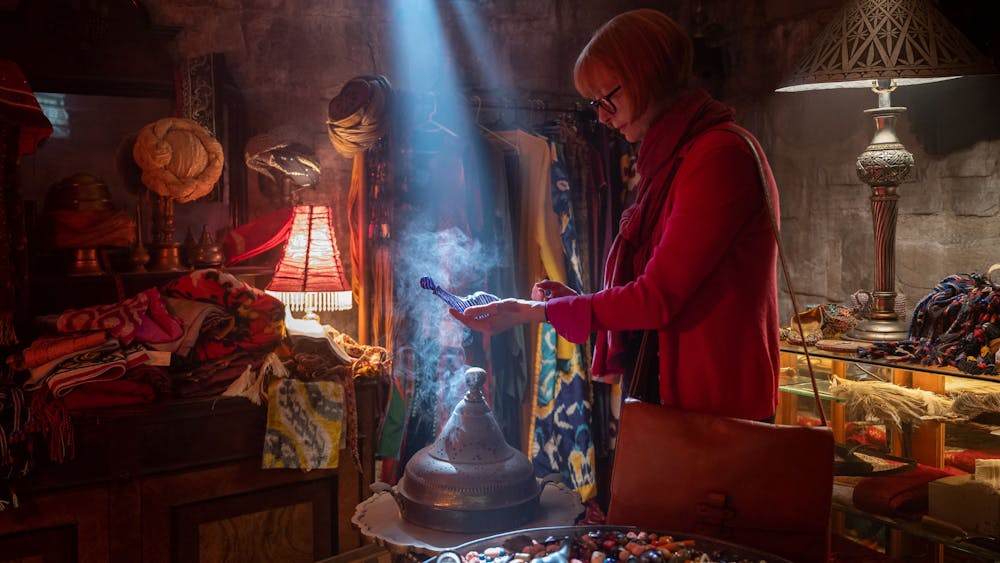So rarely does a film fulfill all of our wishes. It is common practice, especially in the age of franchise hegemony, for viewers to air their grievances about just how a particular film falls short of their expectations. But do we really know what we want from films? And if we could rub a magic bottle, out of which would pop not a djinn (or genie), but a filmmaker, would we know what to wish for?
I have no idea what I would have asked for from George Miller, director of “Three Thousand Years of Longing,” which centers on the relationship between a djinn (Idris Elba) and the woman (Tilda Swinton) who rescues him from his “incarceration” in a small crystalline bottle she purchases in a tucked away bazaar shop in Istanbul. And yet I left the film feeling satisfied in a peculiarly personal way, almost as if that wish I had never made had been fulfilled. “Three Thousand Years of Longing” is imbued with a genuinely refreshing humanistic spirit — made up of a sincere fascination with human history and narrative mythology — which is particularly poignant for its stark contrast to the general preoccupations of contemporary cinema. The film — with its unpretentious, if indulgent, focus on the meaning of story — arrives at the perfect moment, and has made me wish for more perspectives like it.
Much of “Three Thousand Years of Longing” takes place in one room, a well-furnished suite at a luxury Istanbul hotel, occupied by one Alithea Binnie, an English “narratologist” in town for a conference. But thanks to the film’s frame tale structure, complete with wonderfully illustrated title cards and presided over by Elba’s magisterial narration, through which the djinn recounts his life journey to Alithea, the bulk of the film really takes place in such exotic and faraway scapes as Biblical Sheba and the early modern Ottoman Empire, lands haunted by the djinn in his strange, eventful and painfully immortal history of being trapped by his own fatal love for humans.
Structure and close attention to character give disguise to the film’s maximalism — it’s an epic, but sneakily — and it is in parallel both a tiny two-person drama and a sweeping saga that merits that epithet “epic,” in the original and truest sense of the word. It is a sumptuous visual fantasy of stunning vistas, lavish sets and costumes and occasionally goofy, occasionally breathtaking experimentation with visual effects (one of the most marvelous images in the film is the soaring shot of a bird, thousands of feet above the glittering Red Sea, with the djinn’s bottle in its talons, only to release it in the depths below). Miller’s artistic mastery is what astonishes most in the film; he harnesses as many tools of the trade as he can muster toward the noble goal of an utterly transportive film experience. In this respect, he succeeds mightily.
Where the film is most vulnerable to complaint and criticism — from those, say, who may feel their wishes have been manipulated by some trickster djinn of a filmmaker — is in the sheer level of its indulgence. Indeed, those who are themselves indulgent of indulgence (such as myself) will likely revel in how “Three Thousand Years of Longing” takes its sweet time recounting the djinn’s personal history, but the film could probably stand a more exacting editorial eye, despite its modest runtime. Likewise, its fundamental meditative ambiguity — such as the uncertainty of its ending, in which we are left looking inwards to wonder if the djinn can indeed survive in the chaotic world of today — means that the film is unlikely to unify audiences in the way that Miller probably hopes for. Considering that this is his first film since “Mad Max: Fury Road” (2015), which is as near-perfect as any film I can think of, perhaps we can pardon him for, having tasted consensus praise, searching for other targets.
However, the best part about the film and its real draw, by no small margin, is the extraordinary performances by the two leads. Swinton’s erudite eccentricity is characteristically engaging, but I found Elba’s quiet magnificence to be even more spellbinding. He is in command of his unique charge from the outset, and the result is a soulful and sustained performance and the rendering of one of the most fantastically interesting film characters in recent times. When the film ventures somewhat teeteringly into the present — a recognizable world of both hyperconnectivity and isolation — as Alithea attempts to take the djinn to live with her in London, the sheer stretch of the djinn’s story feels comforting and binding. The knowledge that we are part of the same grand and uninterrupted, if challenged, tradition of storytelling makes it feel cool to be old-fashioned. It’s a feeling that’s proof enough that, when we go to the movies, we go for more than we could ever possibly wish for.
Get The Chronicle straight to your inbox
Signup for our weekly newsletter. Cancel at any time.

